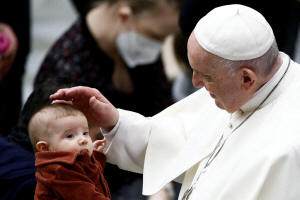'Children should be playing': Pope pleads for fight against child labour
 Send a link to a friend
Send a link to a friend
 [January 12, 2022]
By Philip Pullella [January 12, 2022]
By Philip Pullella
VATICAN CITY (Reuters) - Pope Francis on
Wednesday urged governments to combat child labour, saying it was
terrible that children who should be playing are instead working as
adults or scavenging in garbage dumps for something to sell.
Speaking at his weekly general audience Francis also lamented that in
many countries people were being exploited in the unofficial,
underground economy, working without benefits or legal protection.
"Let's think of the victims of work, of children who are forced to work.
This is terrible," he said.
The U.N. International Labour Organization (ILO) said in a report last
year that the number of children in labour rose to about 160 million
worldwide in 2020.
"Children who are at an age when they should be playing are forced to
work like adults. Let's think of those children, poor little things, who
scour in garbage dumps looking for something useful to trade or sell,"
the pope said in comments that were mostly improvised.
The ILO report, done with the U.N. children agency UNICEF, said progress
to end child labour had stalled for the first time in 20 years at the
start of the COVID-19 pandemic, reversing a previous downward trend.

[to top of second column]
|

Pope Francis blesses a child after the weekly general audience at
the Paul VI Audience Hall at the Vatican, January 12, 2022. REUTERS/Guglielmo
Mangiapane
 He said that lack of work was a
"social injustice" and that while charity and handouts for the
jobless were important, they filled the stomach but did not dispense
dignity.
"Governments must give everyone the possibility of earning their
bread because this gives them dignity. Work anoints people with
dignity," he said.
According to the ILO, Africa has the largest number of child workers
in the world, with about 72 million, about 43 percent of them doing
hazardous work.
At the audience, Francis asked for a moment of silence to remember
the unemployed, victims of industrial accidents and those who had
taken their own lives after losing their jobs because of the
pandemic.
(Reporting by Philip Pullella; Editing by Alexandra Hudson)
[© 2022 Thomson Reuters. All rights
reserved.] This material may not be published,
broadcast, rewritten or redistributed.
Thompson Reuters is solely responsible for this content. |